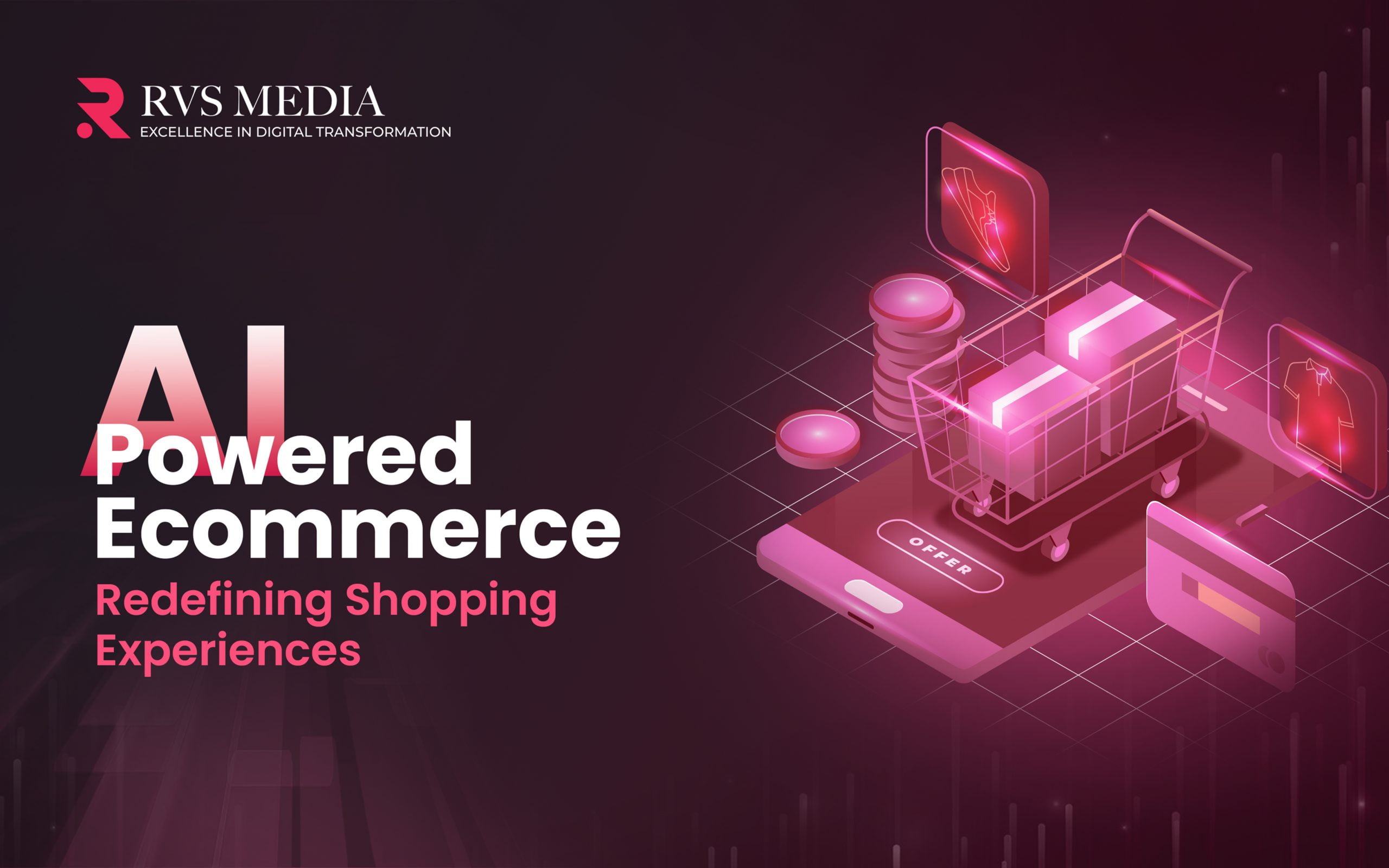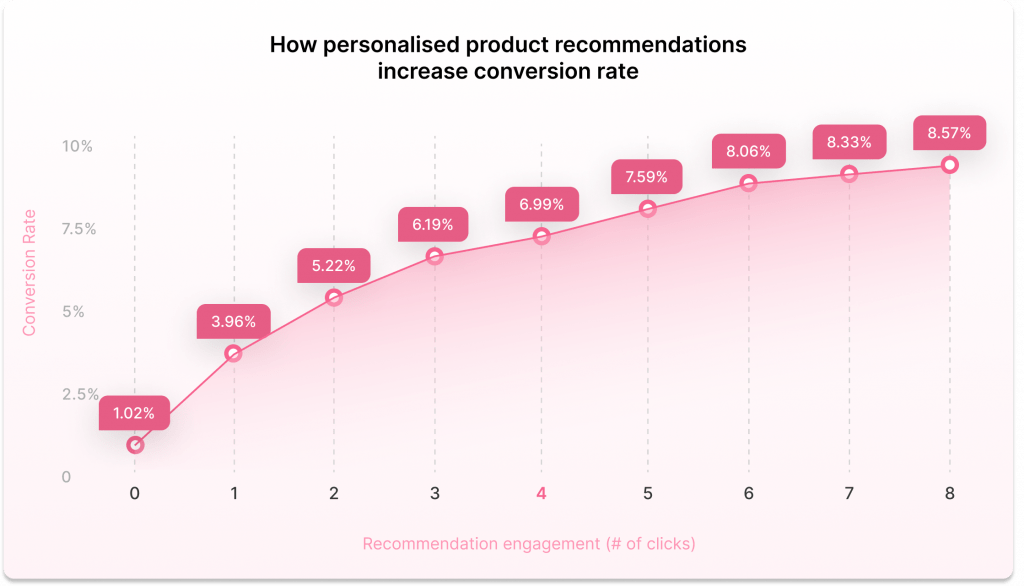How AI-Powered Ecommerce is Revolutionising Shopping Experiences in 2024?
- April 2, 2024
- by Jasreet Kaur


In today’s rapidly evolving digital marketplace, staying ahead necessitates a relentless pursuit of innovation. Amidst the hustle and bustle of the year 2024, one technological marvel shines brighter than the rest: Artificial Intelligence (AI). Its seamless integration into ecommerce platforms has heralded a transformative era characterised by personalised, efficient, and immersive shopping experiences. Here is a journey to discover how AI is fundamentally reshaping online shopping and redefining customer interactions.
For understanding the impact of AI in ecommerce requires a glance back at the remarkable journey of digital commerce. The first rudimentary online storefronts paved the way for global digital marketplaces. Consider the likes of Amazon, once a modest online bookseller, now a behemoth dominating virtually every sector of retail.
However, as the digital landscape expanded, so did consumer expectations. Today’s shoppers demand seamless experiences, personalised recommendations, and lightning-fast delivery. To meet these escalating demands, merchants face the challenge of adapting their strategies continually. This is where AI emerges as the ultimate game-changer, offering dynamic solutions to revolutionise every facet of the shopping journey.
Take, for instance, the evolution of Amazon. What started as an online bookstore has evolved into a retail empire fueled by AI-driven algorithms. Amazon’s recommendation engine, powered by sophisticated AI, analyzes customer data to offer personalised product suggestions, significantly enhancing the shopping experience. This level of personalisation not only drives sales but also fosters customer loyalty, setting a high bar for competitors.
Furthermore, consider the rise of platforms like Shopify, empowering small businesses to establish and scale their online presence. Shopify uses AI to optimise operations, target marketing efforts, and deliver exceptional customer experiences. AI democratisation allows businesses of all sizes to compete in the digital marketplace.
In essence, the evolution of ecommerce has been propelled by the relentless pursuit of innovation, with AI emerging as the linchpin of this transformation. As consumer expectations continue to evolve, merchants must embrace AI-driven solutions to remain competitive and deliver unparalleled shopping experiences. The integration of AI into ecommerce platforms represents not just a technological advancement but a fundamental shift in how businesses engage with their customers in the digital age.

AI’s ascent in ecommerce has been transformative, touching every aspect of the customer experience. Let’s explore how AI is reshaping the landscape:
According to a study by McKinsey, 91% of consumers are more likely to shop with brands that provide relevant offers and recommendations. AI enables personalised shopping experiences by analyzing customer data, such as past purchases and browsing history, to tailor product suggestions and promotions to each individual’s preferences.

Amazon attributes 35% of its revenue to its recommendation engine, which uses AI algorithms to suggest products based on customers’ past purchases and behavior. This level of personalisation not only drives sales but also enhances customer satisfaction and loyalty.
Airlines like Delta and hotels like Marriott use AI-powered dynamic pricing to adjust prices in real-time based on factors such as demand, competitor pricing, and historical booking data. This strategy has been shown to increase revenue by optimising prices for maximum profitability while remaining competitive in the market.
Walmart implemented an AI-driven inventory management system that analyzes sales data, weather forecasts, and historical trends to predict demand and optimise inventory levels. This system resulted in a significant reduction in out-of-stock items and improved overall sales performance.
According to IBM, businesses that use AI-powered chatbots for customer service experience a 70-80% reduction in call, chat, and email inquiries. AI-driven chatbots provide instant support, answer frequently asked questions, and escalate complex issues to human agents when necessary, leading to faster resolution times and higher customer satisfaction rates.
Sephora’s virtual assistant, powered by AI, handles over 2 million conversations per month and has an accuracy rate of over 90%. Customers can ask questions about products, receive personalised recommendations, and even try on virtual makeup using the chatbot, providing a seamless and interactive shopping experience.
IKEA Place, an AR app developed by IKEA, allows customers to visualise how furniture will look in their homes before making a purchase. The app uses AR technology to superimpose virtual furniture onto the user’s real environment, helping them make informed decisions and reducing the likelihood of returns.
Domino’s Pizza implemented an AI-powered tracking system that allows customers to track their orders in real-time from the oven to their doorstep. This transparency not only enhances the customer experience but also reduces anxiety and improves overall satisfaction with the brand.
Pinterest’s visual search tool, powered by AI, processes over 600 million visual searches every month. Users can snap a photo of an object or select an image from their camera roll, and Pinterest will suggest visually similar products, recipes, or DIY projects, facilitating seamless product discovery and inspiration.
ASOS implemented a visual search feature on its mobile app, allowing customers to upload photos of clothing items they like and find similar products from ASOS’s inventory. This feature has increased user engagement and conversion rates by making it easier for customers to find the exact items they are looking for.
Warby Parker’s virtual try-on tool, powered by AR, has led to a 30% increase in conversion rates for glasses purchased online. Customers can see how different frames look on their face in real-time using their smartphone camera, eliminating the need to visit a physical store to try on glasses.
Alibaba’s “Smile to Pay” technology allows customers to pay for their purchases using facial recognition technology. This frictionless checkout process reduces the time spent at the cashier and enhances security by eliminating the need for physical payment methods like cash or cards.
Amazon’s patented “1-Click” ordering system, which uses AI algorithms to predict and pre-load customers’ preferred shipping and payment options, has been shown to increase conversion rates by up to 5%. This streamlined checkout process minimises friction and encourages impulse purchases.
PayPal’s AI-powered fraud detection system analyzes millions of transactions every day to identify suspicious activity and prevent fraudulent transactions. This proactive approach to security protects both merchants and customers from potential losses and maintains trust in the platform.
Coca-Cola uses AI algorithms to optimise its supply chain by forecasting demand, managing inventory levels, and optimising transportation routes. This data-driven approach has led to significant cost savings and efficiency improvements, ensuring products are delivered to customers in a timely manner while minimising waste and operational costs.
As ecommerce business owners, you may wonder how you can stay ahead of the curve and anticipate fluctuations in customer demand. Enter AI-driven demand forecasting, a cutting-edge solution poised to revolutionise the way you manage inventory and production schedules. Wondering what AI-driven demand forecasting is? Let us walk you through it!
What is AI-driven Demand Forecasting?
AI-driven demand forecasting utilises advanced algorithms to analyze vast amounts of historical data and external factors. By scrutinising past sales trends, customer behavior patterns, market conditions, and even factors like weather or economic indicators, AI can accurately predict future demand with unprecedented precision.

The ability to accurately predict demand empowers ecommerce businesses in several ways:
By harnessing the power of AI to predict demand accurately, you can optimise inventory management, streamline production processes, and ultimately drive growth and profitability in your business.
As we look ahead, the future of AI in ecommerce promises even more groundbreaking advancements:
In the foreseeable future, the trajectory of AI in ecommerce promises a profound transformation, marked by a spectrum of advancements poised to redefine the online shopping landscape. These anticipated developments encompass a broad range of possibilities, from the refinement of hyper-personalisation to the enrichment of augmented reality (AR) experiences. As a result, the essence of how we shop and engage with brands in the digital sphere is destined to undergo a revolutionary evolution.

In conclusion, AI-powered ecommerce is revolutionising shopping experiences in 2024 and beyond. From personalised recommendations to seamless checkout processes, AI is reshaping every aspect of the customer journey, driving innovation, and delivering unparalleled convenience. As we embrace the transformative power of AI, we can look forward to a future where shopping is not just a transaction but an immersive and delightful experience tailored to each individual’s preferences and needs.